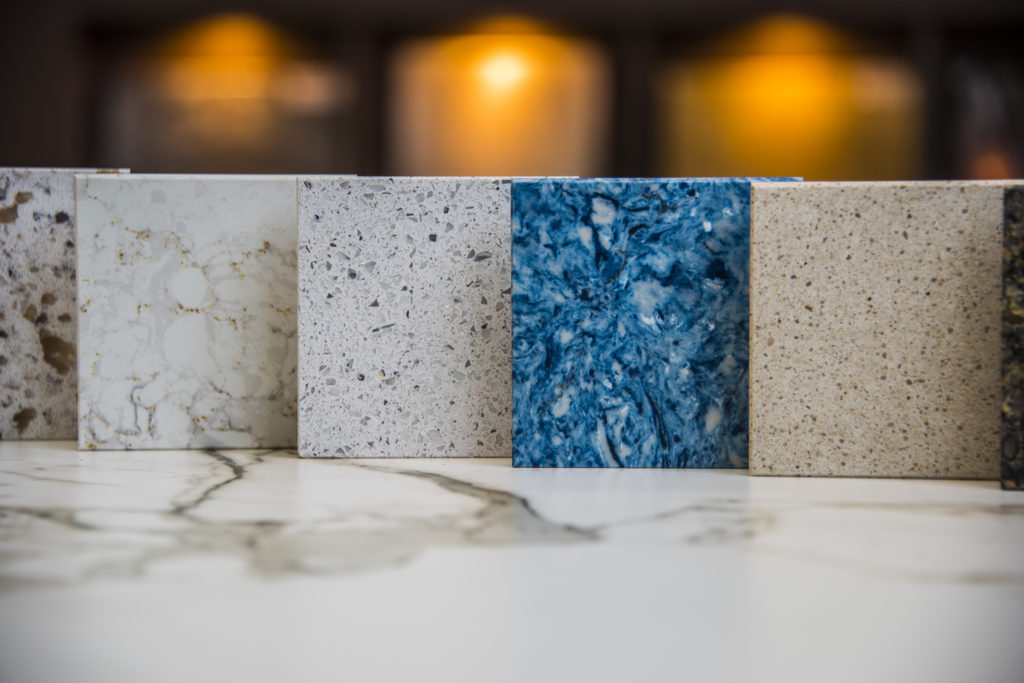A common question and even debate that arises during kitchen remodels are whether to choose granite or quartz countertops to complete the new look. Many people have different opinions when it comes to the two options, but we’re here to set the record straight and take an honest look at the difference between quartz and granite. We won’t pick favorites, but learning about the qualities, advantages, and disadvantages of granite and quartz might help you determine the best solution for your kitchen makeover. The first step is to identify what each material is, and how that factors into your decision-making process.

Granite
Granite is 100% naturally occurring stone in its unaltered form. You’ve probably seen granite while driving down the highway or when exploring numerous parks and hiking trails all over the map, though most of the granite you’ll find inside remodeled kitchens comes from places like Brazil, China, and even Madagascar. Mines are set up in places where the earth contains a high concentration of granite and large specialized equipment is used to cut the stone into slab form before it is polished into the glass-like finish we see in many high-end kitchens.
Pros
- Granite showcases the look of natural stone and can display some extremely unique patterns and lines that can complement rustic and modern styles alike.
- Stone doesn’t burn – nor will it scratch if you cut on it – so you can utilize more cooking and prep space without the worry of damaging your countertops.
Cons
- Because granite is a stone, it’s naturally porous. Granite countertops need to be sealed. New sealers on the market can seal the stone for up to 15 years.
- Natural defects in the stone can cause chipping or cracking that must be repaired quickly in order for the slab to keep up its structural integrity.
Quartz
The big difference between granite vs quartz is that quartz doesn’t occur naturally in a form that can be cut into countertops – instead, slabs are engineered and manufactured from a combination of crushed quartz, resins, and other materials. This means that there is a virtually infinite number of pattern possibilities.
Pros
- Due to the resin and other binding agents used to manufacture quartz countertops, they are impermeable and don’t require any regular sealing.
- Quartz countertops are less dense than most granite countertops. You should not cut on quartz countertops because they can be scratched. You should also not set hot pots on quartz countertops as they can be scorched.
- The manufacturing process for quartz countertops is a more environmentally friendly option compared to the extraction, transportation, and cutting that granite slabs require.
Cons
- While quartz countertops can provide a very high-end look for any kitchen or bathroom, they don’t boast the same natural beauty that granite does. This is a big one for many homeowners who are looking for authentic materials to complete their space.
- Quartz can be more expensive than granite due to its detailed manufacturing process.
Call Pebbles Stone Slabs for Quality Material and Expert Advice
The difference between quartz and granite that will sway you one way or the other is likely to be based on personal preference. For some, the natural look of granite just can’t be beaten, and a little added maintenance is worth it. For others, it’s all about matching to a specific style, and the vast array of quartz options can be enticing. Both countertop quartz and granite options are excellent choices for your kitchen or bathroom remodel, and Pebbles Stone Slabs is ready to assist you in making the right choice for your needs.
Visit our indoor slab yard and showroom to get ideas for your home, or call us at (720) 405-2000 to discuss your project with our dedicated team.
